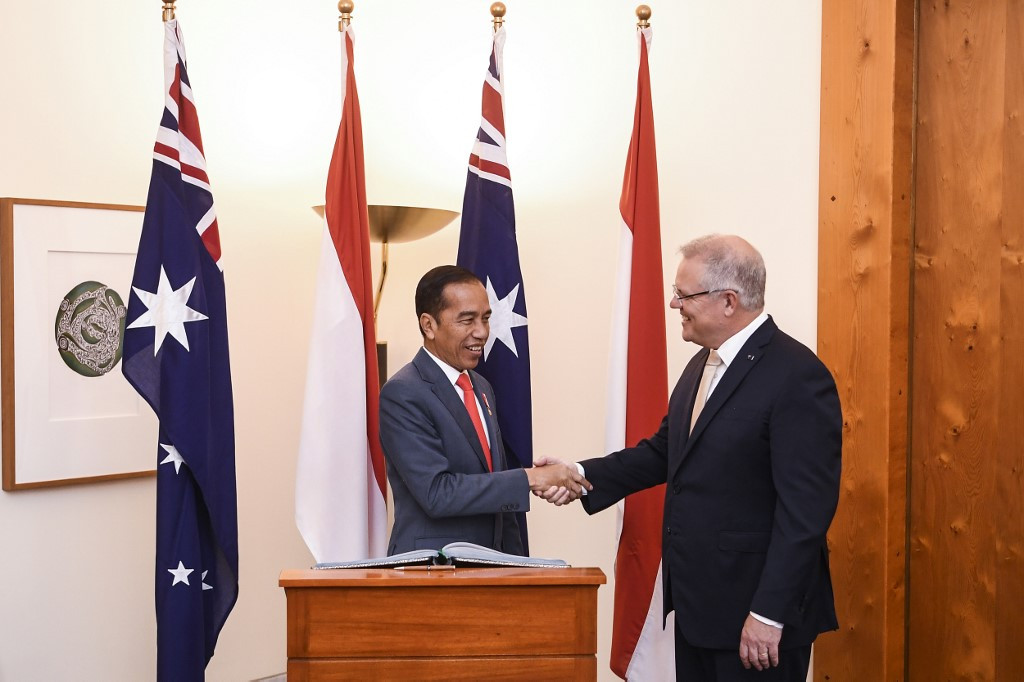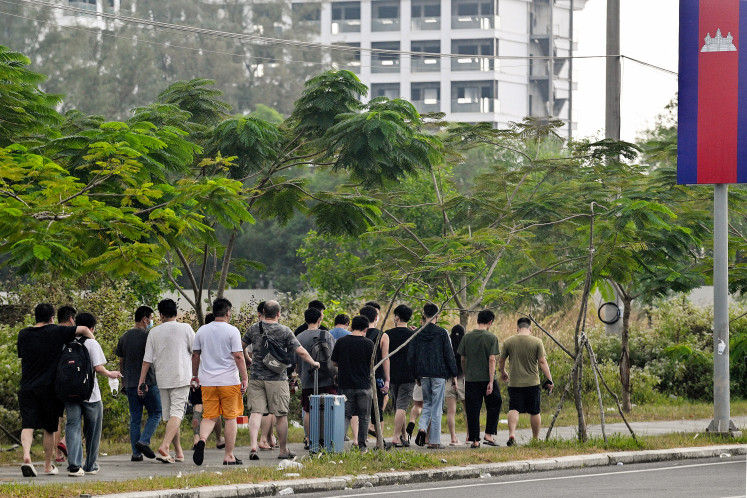Popular Reads
Top Results
Can't find what you're looking for?
View all search resultsPopular Reads
Top Results
Can't find what you're looking for?
View all search resultsIndonesia: Good friends but still with some reservations
Regular surveys conducted by the highly respected Lowy Institute show that Australians – including businesspeople – feel limited warmth toward Indonesians, and rate them only slightly higher than Russians and Egyptians in terms of how we perceive them.
Change text size
Gift Premium Articles
to Anyone
A
s Indonesia’s President Joko "Jokowi" Widodo addressed the Australian Parliament in Canberra on Monday, officials from both countries can breathe a little easier in the knowledge that the bilateral relationship is in good shape.
Australia continues to enjoy a positive working relationship between the Australian Federal Police (AFP) and the Indonesian National Police that goes a long way to keeping over 1.2 million Australians safe while vacationing in Bali each year. The respective defense forces are increasing their communications and activities as our region becomes less stable. Australian Defense Minister Linda Reynolds is certainly Indonesia-savvy, having lived here some years ago. Senior officials in both nations' foreign affairs departments work cooperatively, with their respective foreign ministers, Marise Payne and Retno Marsudi in regular touch. And the educational and relatively small business-to-business links continue to be very warm.
And it is in the area of business where both leaders will seek to give the relationship a large boost during this presidential visit. With the Australian parliament having ratified the Indonesia-Australia Comprehensive Economic Partnership Agreement (IA-CEPA) last October, Trade Ministry officials in Jakarta worked overtime last week to also have the deal approved by the House of Representatives before the President’s address to a joint sitting of the Australian parliament today. The President’s speech marked a significant advancement of this critical relationship, and for trade and business links, despite some concerns within Indonesia that the trade deal puts Indonesian workers and small businesses at a disadvantage.
With gross domestic product (GDP) growth at 5 percent - a growth rate most advanced nations would cheer about – Jokowi is under pressure to boost the economy and create more and better jobs, particularly for the 95 million people under 35 years of age, and to achieve a GDP growth of around 7 percent per year that is needed.
For both countries, the IA-CEPA will create access to a wide range of agricultural products, including the expansion of Australia's beef exports, allowing partnerships to form to "add value" in Indonesia with third-party exports to nations in North Asia, the Middle East and Europe. Education, technology and medical sectors would also benefit enormously, along with opportunities in infrastructure and aged-care, where qualified Indonesian nursing staff could be engaged within nursing homes in Australia - where the availability of quality and caring staff is at a crisis level – boosting people-to-people links within a key area that affects many.
Business groups and NGOs are also encouraging the government to use the IA-CEPA to expand these people-to-people links as a matter of priority, as despite the positive news about the current bilateral relationship, it overlooks one significant flaw: its shallowness. In Australia, we generally find a community that – notwithstanding Bali – sees Indonesia through a prism of ignorance and ambivalence.
Regular surveys conducted by the highly respected Lowy Institute show that Australians – including businesspeople – feel limited warmth toward Indonesians, and rate them only slightly higher than Russians and Egyptians in terms of how we perceive them. Over the past 10 years, the study of the Indonesian language in Australian high schools and tertiary institutions has also collapsed, contributing to this malaise within the relationship between our two countries.
Work is already being done in getting Australians and Indonesians to know each other better, and last year the New Colombo Plan sent over 700 young Australians to live and study in Indonesia, but Jakarta needs to make it easier for these mostly young people to obtain visas and work-experience permits. Likewise, the Holiday-Work program that allows young foreign travelers to visit Australia has been expanded to allow up to 1,000 young Indonesians to holiday and work there annually but it also needs to be simplified and cheaper for young Indonesians to access these opportunities.
These are positive programs but tourism from Indonesia continues to lag badly. Last year, 9.1 million Indonesians traveled abroad, yet only 1.75 percent chose to vacation in Australia, primarily due to the red-tape and cost of applying for a visa. Australia currently attracts a pitiful 126,800 Indonesian vacationers each year - compared with 280,713 from Singapore and 242,000 from Malaysia – costing the economy millions of dollars at a time when the Australian tourist sector is struggling post bushfires, and in recent weeks, due to the coronavirus that is impacting tourism from China dramatically. Indications are that Pak Jokowi will formally raise the issue of visas with Prime Minister Scott Morrison during their talks.
Notwithstanding the reluctance of both countries to acknowledge the people-to-people issue as an impediment to creating more depth in the relationship, the visit to Australia by President Jokowi will be successful and also genuinely warm, as our two leaders get to know each other better at a critical time in our region.
With the formal ratification of the IA-CEPA trade deal, the remaining bilateral challenge for both countries is to build capacity in this relationship between Australia and Indonesia by getting our border security policies and the critical people-to-people links correctly balanced and to create an environment where we can all get to know each other better and more often.
***
Ross B. Taylor AM is the president of Perth’s Indonesia Institute Inc. and former national vice-president of the Australia-Indonesia Business Council.










